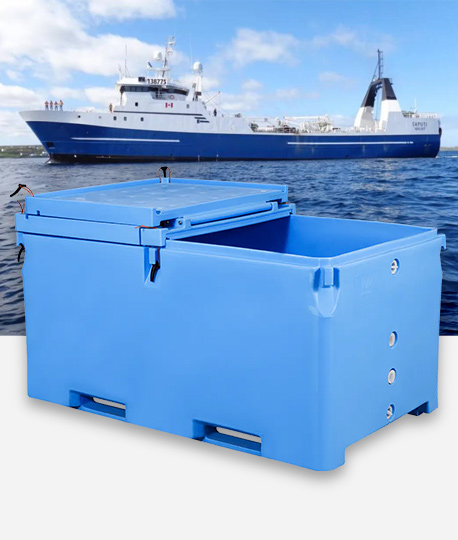When it comes to choosing the best storage solution for your business, the debate between insulated bulk storage containers and regular storage containers is crucial. Each type of storage container has its own set of advantages and considerations, particularly when it comes to temperature-sensitive goods like food, pharmaceuticals, or chemicals.
What Are Insulated Bulk Storage Containers?
Insulated bulk storage containers are specifically designed to keep products at a stable temperature, providing optimal storage conditions for perishable or temperature-sensitive goods. These containers are typically made from double-walled materials and are filled with insulating materials such as PU (Polyurethane) foam, which helps maintain the desired internal temperature for longer periods.
The main advantage of insulated containers is their ability to keep goods at a consistent temperature, whether hot or cold. This is essential for industries like food storage, pharmaceuticals, and chemicals, where temperature control is critical to product quality and compliance with industry standards.

Advantages of Insulated Bulk Storage Containers
Superior Temperature Control: Insulated bulk containers are engineered to maintain temperature stability, which is essential for preserving the quality of perishable goods.
Energy Efficiency: These containers reduce the need for additional cooling or heating equipment, helping businesses save on energy costs.
Durability: Insulated containers are made to withstand heavy usage and environmental challenges, extending the lifespan of your storage solution.
Compliance with Health Standards: Many insulated bulk storage containers comply with national food hygiene standards, making them ideal for industries like food and pharmaceuticals.
Long-Term Cost Savings: While they have a higher initial cost, insulated containers can reduce long-term expenses by lowering energy and maintenance costs.
What Are Regular Storage Containers?
Regular storage containers, on the other hand, are typically made of materials like plastic, steel, or wood and are not designed to maintain temperature control. These containers are often used for non-perishable goods or items that do not require strict environmental conditions.
Advantages of Regular Storage Containers
Lower Initial Investment: Regular containers are generally more affordable than insulated bulk storage containers, making them an ideal choice for businesses with a limited budget.
Lighter Weight: These containers tend to be lighter, which makes them easier to handle, transport, and store.
Simple Design: Regular storage containers come in various shapes and sizes, offering flexibility for many types of storage needs.
Insulated Bulk Storage Containers vs. Regular Storage Containers: A Comparison
Here is a quick comparison of insulated bulk storage containers and regular storage containers based on key factors like temperature control, durability, and cost:
| Factor | Insulated Bulk Storage Containers | Regular Storage Containers |
| Temperature Control | Excellent (keeps temperature stable for perishable goods) | None (no temperature regulation) |
| Energy Efficiency | High (reduces the need for refrigeration or heating) | Low (may require additional cooling/heating systems) |
| Initial Cost | Higher (due to insulation materials and construction) | Lower (budget-friendly) |
| Durability | Higher (due to insulation materials and construction) | Medium (suitable for lighter use) |
| Compliance with Industry Standards | Often complies with food and pharmaceutical regulations | Rarely meets strict temperature or hygiene standards |
Key Considerations for Your Business
Choosing between insulated bulk storage containers and regular storage containers largely depends on the nature of your goods and the requirements of your industry. Here are some key factors to consider:
Type of Goods Stored: If your business stores temperature-sensitive items, such as fresh produce, pharmaceuticals, or chemicals, insulated bulk containers are the better choice. They provide the necessary protection against temperature fluctuations, helping to maintain product integrity.
Budget: If you're working with a limited budget and your goods do not require strict temperature control, regular storage containers may be the more affordable option.
Long-Term Costs: While the upfront cost of insulated bulk storage containers may be higher, they can reduce energy costs and maintenance in the long run, leading to potential savings over time.
Space and Handling Requirements: Insulated containers are often bulkier and heavier, which can impact storage space and handling. Regular containers, being lighter, may be easier to move and store, especially in smaller spaces.
Why Choose Ningbo Wanma Plastics Co., Ltd. for Your Insulated Bulk Storage Containers?
At Ningbo Wanma Plastics Co., Ltd., we specialize in the design, manufacture, and development of high-quality insulated bulk storage containers. With over a decade of expertise, we offer a wide range of double-wall containers filled with PU insulation, perfect for storing temperature-sensitive products.
Our insulated bulk containers are widely used in industries such as food, pharmaceuticals, and chemicals, where maintaining temperature stability is essential. All of our products meet national food hygiene standards, ensuring your goods are stored safely and securely.
Here’s why you should consider choosing Wanma Plastics for your insulated storage needs:
High-quality materials: Our containers are built with durable, seamless molding technology for long-lasting performance.
Energy-efficient design: Save on energy costs with our high-quality, insulated containers.
Customization options: We offer tailor-made solutions to fit your specific storage requirements.
Global service: We welcome inquiries from businesses worldwide and are dedicated to delivering exceptional customer service.


 English
English Español
Español عربى
عربى 中文简体
中文简体
-4.png)
-4.png)
-2.png)
-2.png)
-2.png)




